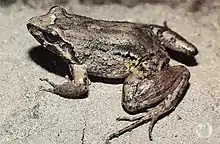Leptodactylus leptodactyloides
Leptodactylus leptodactyloides is a species of frogs in the family Leptodactylidae. Its local name is sapito leptodactilo ("slender-fingered toadlet"). It is found in the greater Amazon Basin and the Guianas (Bolivia, Brazil, Colombia, Ecuador, French Guiana, Guyana, Peru, Suriname, and Venezuela).[1][2] Leptodactylus leptodactyloides occurs in a range of habitats: savannas, open areas, forest edges, and secondary and primary lowland forest. Reproduction takes place in temporary waterbodies.[1]
| Leptodactylus leptodactyloides | |
|---|---|
 | |
| Scientific classification | |
| Kingdom: | Animalia |
| Phylum: | Chordata |
| Class: | Amphibia |
| Order: | Anura |
| Family: | Leptodactylidae |
| Genus: | Leptodactylus |
| Species: | L. leptodactyloides |
| Binomial name | |
| Leptodactylus leptodactyloides (Andersson, 1945) | |
| Synonyms | |
|
Eleutherodactylus leptodactyloides Andersson, 1945 | |
Male Leptodactylus leptodactyloides grow to a snout–vent length of 28–48 mm (1.1–1.9 in) and females to 35–57 mm (1.4–2.2 in).[3]
References
- Coloma, L.A.; Ron, S.; Azevedo-Ramos, C. & La Marca, E. (2004). "Leptodactylus leptodactyloides". IUCN Red List of Threatened Species. 2004: e.T57140A11590413. doi:10.2305/IUCN.UK.2004.RLTS.T57140A11590413.en.
- Frost, Darrel R. (2014). "Leptodactylus leptodactyloides (Andersson, 1945)". Amphibian Species of the World: an Online Reference. Version 6.0. American Museum of Natural History. Retrieved 8 May 2014.
- Heyer, W. R. (1994). "Variation within the Leptodactylus podicipinus–wagneri complex of frogs (Amphibia: Leptodactylidae)" (PDF). Smithsonian Contributions to Zoology. 546: 1–124. doi:10.5479/si.00810282.546.i.
This article is issued from Wikipedia. The text is licensed under Creative Commons - Attribution - Sharealike. Additional terms may apply for the media files.
